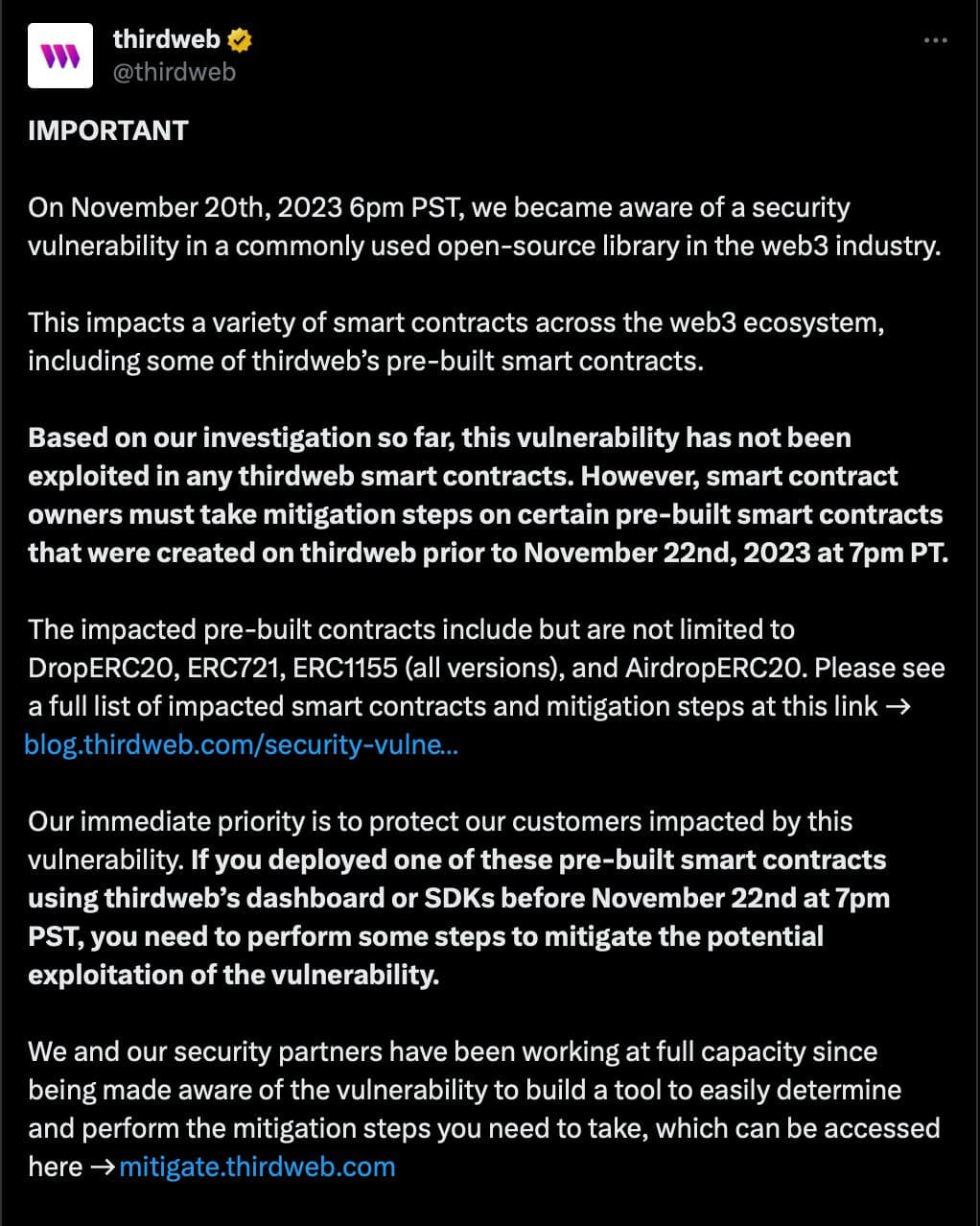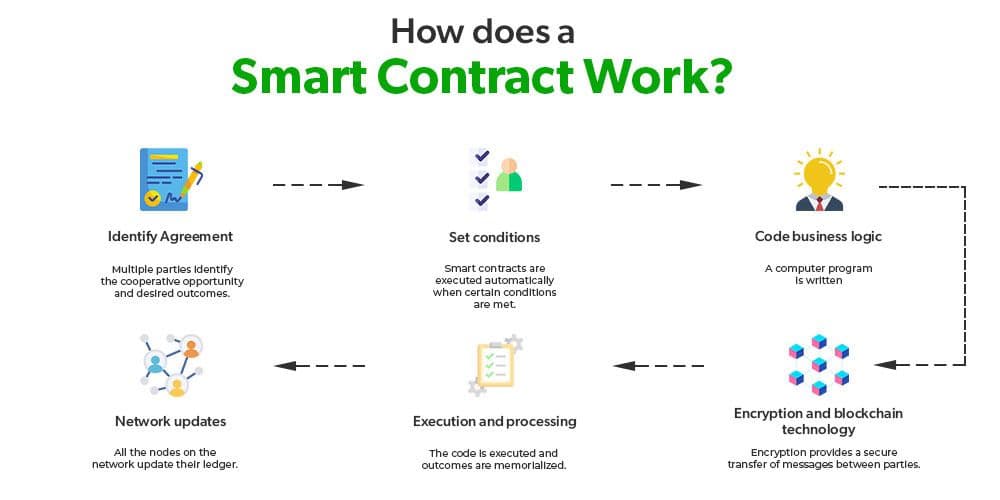Industry
Dec 7, 2023Chain Insights - Why Smart Contract Audits Are Critical to the Future of Blockchain Adoption
The recent smart contract vulnerability disclosure by Thirdweb has sent a significant ripple effect across major players in the Web3 space, notably OpenSea and Coinbase NFT. This incident highlights the vital importance of smart contract audits in the burgeoning digital asset landscape. The security vulnerability, identified in a widely-used Web3 open-source library, potentially affects a number of NFT projects, particularly those developed using Thirdweb's frameworks prior to November 22nd. Among the affected are popular collections featured on OpenSea and Coinbase NFT, with specific contracts such as DropERC20, ERC721, ERC1155, and AirdropERC20 being under scrutiny.
Despite their seemingly straightforward nature, smart contracts, commonly developed in Solidity, are sometimes beset with hidden complexities and hazards. Each line of code holds immense power, where a single error could lead to disastrous consequences. Moreover, the threat isn't just technical; it can also be intentional, as seen in instances of 'rug pulls' where project owners deliberately create backdoors to siphon off funds.
The community is gradually becoming more vigilant in spotting such malicious intents, recognizing the value of audits as a hallmark of integrity. However, another pressing threat looms large: sophisticated hacker attacks. The first quarter of 2023 alone witnessed a staggering loss of $222 million due to such exploits, underscoring the growing complexity and allure of these attacks for cybercriminals.

This ongoing development clearly demonstrates the essential need for thorough and comprehensive smart contract audits. These audits are not just a technical formality but a fundamental aspect of ensuring the integrity, trust, and longevity of projects in the Web3 ecosystem, especially as digital assets and NFTs continue to gain mainstream traction.
To understand the critical role of smart contract audits in the Web3 ecosystem, it's essential to first grasp how smart contracts work and how they are integrated into this digital landscape.
What are Smart Contracts?
Smart contracts are self-executing contracts with the terms of the agreement directly written into lines of code. They are a fundamental component of blockchain technology. Here's a breakdown of their functionality:
- Automated Execution: A smart contract automatically executes actions when predetermined conditions are met, without the need for an intermediary. For example, releasing funds to a party once a service is confirmed.
- Immutable and Distributed: Once deployed, a smart contract cannot be altered. It resides on the blockchain, distributed across multiple nodes, making it transparent and resistant to tampering.
- Conditions and Outcomes: The terms are set in digital form, and the outcomes are executed automatically. These outcomes can include transferring funds, registering a document, or issuing a ticket, among others.
- Language and Platform: They are primarily written in blockchain-specific programming languages like Solidity (for Ethereum) or Vyper, and are deployed on blockchain platforms capable of executing them.

Why Smart Contracts are Critical for the Success of Mainstream Blockchain Adoption
- Security Vulnerabilities and Exploits: Smart contracts are written in code, and like any software, they can contain bugs or vulnerabilities. In blockchain, these vulnerabilities can be more critical due to the immutable nature of the technology – once a contract is deployed, it cannot be altered or patched like traditional software. This makes prior auditing vital to identify and rectify any security flaws that could lead to exploits such as reentrancy attacks (where a function can be repeatedly called in a way that drains funds), overflow/underflow issues (where numeric operations exceed the variable's storage limits), or other logic errors.
- Financial Risks and Irreversibility: Transactions on the blockchain are irreversible. If a smart contract is exploited due to a vulnerability, the financial losses incurred can be substantial and irreversible. This is especially significant in the case of DeFi (Decentralized Finance) applications where large sums of cryptocurrency may be involved.
- Complex Interactions and Composability: Smart contracts often interact with other contracts and external systems (like oracles). This composability can lead to complex interactions that are hard to predict and test for. An audit helps to inspect these interactions to ensure they don't open up new vulnerabilities, particularly in a multi-contract ecosystem where one contract's failure could cascade.
- Gas Optimization and Efficiency: Blockchain transactions require 'gas', a fee that users pay to compensate for the computing energy required to process and validate transactions. Inefficient code can consume more gas than necessary, leading to higher costs. Audits also focus on optimizing the contract's efficiency to minimize gas consumption, which is crucial for user experience and cost-effectiveness.
- Compliance and Legal Implications: In some jurisdictions, there are emerging regulations around digital assets and blockchain technology. Smart contract audits can ensure compliance with these regulations, reducing the legal risks associated with deploying non-compliant contracts.
- Community Trust and Project Credibility: In the blockchain community, trust is paramount. A project that undergoes rigorous auditing is more likely to be trusted by users and investors. This trust is critical for the adoption and success of a blockchain project, as it directly impacts user participation and investment.
- Best Practices and Code Quality: Audits enforce coding best practices and high-quality standards. They often involve peer review and testing methodologies that are crucial for maintaining high-quality code. This is important in a space that's still relatively new and evolving rapidly, as it helps in setting high standards for development.
- Future Proofing: As blockchain technology evolves, so do the tactics of malicious actors. Audits must not only address current known vulnerabilities but also anticipate potential future security issues. This forward-thinking approach is crucial for the long-term viability and security of a smart contract.
The Anatomy of a Security Audit
A security audit is a meticulous process designed to unearth vulnerabilities in decentralized apps (dApps), smart contracts, protocols, or blockchains. This process is not just a cursory glance but a comprehensive evaluation, ensuring that every potential entry point for attackers, be it an insider or an outsider, is thoroughly examined.
However, the effectiveness of these audits vary. The blockchain world is not immune to scams, including those perpetrated by auditors who provide superficial or misleading reports. A credible audit delves deep, offering a transparent overview of the project and its issues, fixed or unfixed.
The audit process encompasses several key steps:
- Initial Overview: Understanding the full scope and intended functionality of the smart contract or dApp sets the stage for a thorough audit.
- Automated and Manual Audits: The combination of automated checks and manual scrutiny ensures both apparent and subtle issues are identified. Automated audits flag obvious problems, while manual audits conducted by seasoned professionals delve into the deeper intricacies of the code and its alignment with the intended business logic.
- Continuous Vigilance: Perfection in auditing is an aspirational goal, but the best in the field strive to identify as many issues as possible, regardless of their severity.
Dispelling Myths, Embracing Realities
Auditing in the blockchain space is shrouded in both myths and truths. A crucial reality is that audits are beneficial for both project owners and users. They signify a commitment to security and integrity. However, it's a myth that audits offer an ironclad guarantee of safety. Vulnerabilities may still exist, especially if they are linked to third-party protocols or if developers overlook auditor recommendations.
Another vital truth is the necessity of audits. A project without an audit is a red flag, signaling potential risks and a lack of commitment to quality and security. Conversely, it's a myth that a single audit suffices. The dynamic nature of blockchain projects means that even minor code changes can introduce new vulnerabilities, necessitating regular re-audits.
Conclusion
In the realm of blockchain and smart contracts, security audits have transitioned from a best practice to an industry standard. They are not just a checkbox in the development process but a critical component that can make or break a project's credibility and success. In a landscape where overlooking an audit can lead to catastrophic outcomes, their importance cannot be overstated.
About Chain
Chain is a blockchain infrastructure solution company that has been on a mission to enable a smarter and more connected economy since 2014. Chain offers builders in the Web3 industry services that help streamline the process of developing, and maintaining their blockchain infrastructures. Chain implements a SaaS model for its products that addresses the complexities of overall blockchain management. Chain offers a variety of products such as Ledger, Cloud, and NFTs as a service. Companies who choose to utilize Chain’s services will be able to free up resources for developers and cut costs so that clients can focus on their own products and customer experience. Learn more: https://chain.com.
Connect with Chain for the latest updates:
Twitter: twitter.com/Chain
Facebook: facebook.com/Chain
Instagram: instagram.com/Chain
Telegram: t.me/Chain
Youtube: youtube.com/chain
Chain News & Updates
Latest News & Updates
Sign up for the Chain Newsletter - a weekly roundup of new platform features and the latest from the industry.
